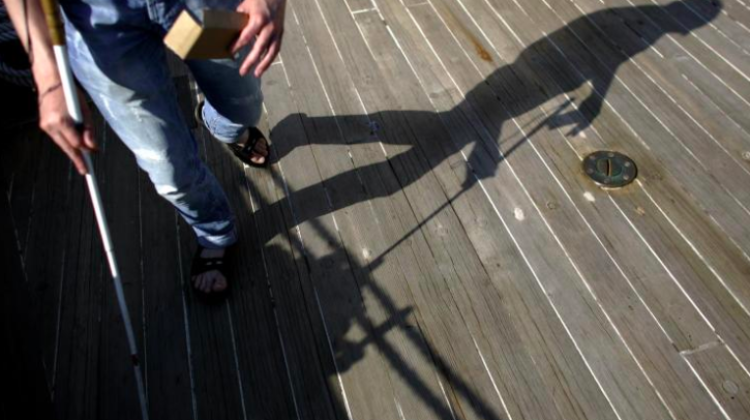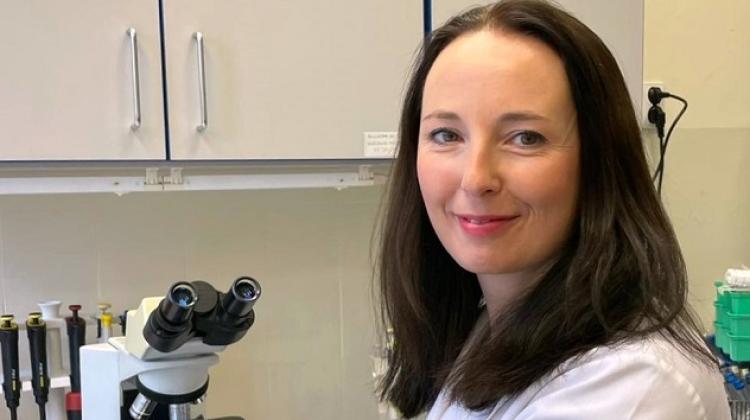Polish application will teach the blind echolocation
 Photo: PAP/Adam Warżawa 01.08.2008
Photo: PAP/Adam Warżawa 01.08.2008
Not only bats or dolphins can use echolocation. People can do that too, but they need time and appropriate tools to learn it. Polish company is working on the app Echo-Vis designed to help blind people learn the skills of echolocation that would be useful in their daily life.
In Andrzej Jakimowski`s film Imagine, a blind teacher impresses his students with the ability to navigate. He wanders the streets without using a walking stick, he can find a bike in the yard. He does all that by clapping, using shoes with special, noisy heels and listening.
The main character`s skills shown in the film are not just a film fiction. He owes his abilities to trained echolocation, which is used not only by bats or dolphins, but also by people, albeit to a much lesser extent. Blind British blind traveller James Holman was among those people; he used a cane with metal fitting. This cane striking the ground produced an acoustic wave which, on contact with an object, caused an echo. Holman was able to navigate by listening to that echo. He was not the only one to have this skill. One of the people who currently use echolocation is a blind American, Daniel Kish. He makes clicking noises with his tongue and uses echolocation so well that he can, for example, ride a bicycle.
But learning to use echolocation is not easy. The tool designed to help is Echo-Vis, an app developed by the Polish company Transition Technologies in cooperation with scientists and with the active participation of experts from the blind and visually impaired community.
"Echolocation allows a blind person (and a seeing person as well) to assess how far an object is, what size it is and even what it is made of using only the sense of hearing. Of course, it is only an approximation, because humans are not able to use echolocation as well as animals do" - one of the authors of the solution, Sławomir Strugarek from Transition Technologies.
The skill of echolocation can be useful to a blind person walking along the sidewalk, allowing that person to avoid a parked car, an information board, branches, or a road sign in the pavement. It allows the blind to find out if they are passing a building, an open space or a forest. No special devices are needed to emit the sound, making clicking noises with the tongue is sufficient. Echolocation also allows to identify objects and surroundings based on the sounds they emit - passing cars, people, steps, street noises.
The solution will consist of a series of educational games. Users will be able to compete with others and collect points. "Learning through play and competition is more encouraging" - notes Strugarek. "We want people with different levels of echolocation skills to be able to use the games: from the basic level to the expert level" - says the co-creator of the app.
A demonstration game has already been developed. In that game, the player has to cross streets of different widths and under different conditions, with lights, or with an ordinary pedestrian crossing. In the latter situation, the player has to listen for a gap between cars to safely pass.
Younger children will, for example, learn to recognize animals, distinguish between a small and large dog, determine from which side it is approaching, how many animals there are - one or maybe a group. The next stage may be mixing sounds that will overlap. In this way, the difficulty of tasks will increase.
The authors also want to develop adventure games, in which a specific scenario has to be completed: only using hearing, the player will sneak into an office, find hidden documents, reach a specific place.
Game developers record various sounds: car sounds, wind noise, pneumatic hammer, passing tram. They put those sounds in games and, with a wide range of sounds, they can create different scenarios in the sound space. Binaural recording is also possible, that is sound recording using special microphones that collect all the sounds that can be heard in a given place. But according to Strugarek this is a difficult, time-consuming and labour-intensive method.
The authors are also working on creating a virtual sound space with the use of unique, proprietary algorithms for generating spatial sound with its reflections and echoes. "What we cannot record, we will create in a computer" - Strugarek adds.
Individual elements of the solution will be made available gradually. To use the games, users only need an Android or iOS smartphone and regular stereo headphones.
The development of games is financed by the National Centre for Research and Development as part of the GameInn program. The project will continue until 2020 in a consortium with Utilitia - a social enterprise that employs and activates people with disabilities, in cooperation with Lodz University of Technology and educational centres for the blind. "Spatial orientation teachers of the blind told us that they could use a tool that would help teach certain things without actually being in a given sound space" - explains Strugarek.
PAP - Science in Poland, Ewelina Krajczyńska
ekr/ agt/ kap/
tr. RL
Przed dodaniem komentarza prosimy o zapoznanie z Regulaminem forum serwisu Nauka w Polsce.














